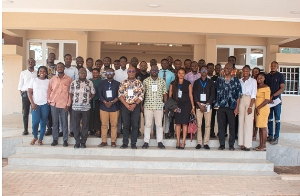 Energy experts captured in a photo
Energy experts captured in a photo
A workshop on energy decarbonization and transitioning Ghana towards a low-carbon economy was held on 11 March at the University of Energy and Natural Resources (UENR).
The event was organized by the Regional Center for Energy and Environmental Sustainability (RCEES) at UENR in collaboration with the Energy Citizens for Inclusive Decarbonization (ENCLUDE) initiative from TU Delft University in the Netherlands.
The one-day workshop brought together researchers, students, industry representatives, and policymakers to share insights and solutions for reducing greenhouse gas emissions in Ghana's energy sector.
Opening the proceedings was for the workshop Prof. Samuel Gyamfi, Deputy Director of RCEES, who outlined the objectives of promoting dialogue on energy decarbonization strategies. The Project Supervisor for ENCLUDE, Dr. Hammond Antwi Sarpong provided an overview of the theme for the seminar, setting the stage for technical presentations and panel discussions.
The first session featured presentations by two students, Mr. Samuel Kyeremeh (A master's student) and Mr. Mudarisu Mahama (A PhD student), on their research findings. Mr. Kyeremeh delved into "Contextualizing the Emergence of Energy Citizenship in Ghana: A Case Study of Island Communities in Volta Region."
His presentation shed light on the persistent energy poverty faced by certain island communities in the Volta Region and the need for inclusive decision-making processes in energy initiatives to help bring change.
Mr. Mahama's presentation focused on "Green House Gas Emissions Reduction in the Electricity Sector: Implications of Increasing Renewable Energy Penetration in Ghana's Electricity Generation Mix." He highlighted the crucial role of energy in economic growth and development and emphasized the potential of renewable energy sources in mitigating climate change by reducing greenhouse gas emissions.
A roundtable followed with representatives from the Regional Coordinating Council, Environmental Protection Agency, and the student researchers. Panelists examined policy barriers and enablers for transitioning Ghana's energy mix away from fossil fuels towards renewable sources like solar, wind, and bioenergy.
"Continued collaboration between universities, industry, and government will be vital for realizing our decarbonization goals while ensuring no communities are left behind," said Prof. Gyamfi in closing the event.
The workshop was part of ongoing efforts in Ghana to meet emissions reduction targets under the Paris Agreement while providing modern, affordable energy access to support sustainable development.